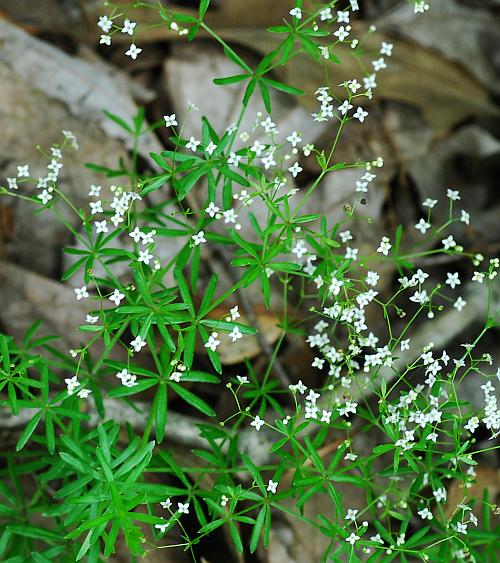Galium concinnum Torr. & A. Gray
Shining Bedstraw

Native
CC = 4
CW = 5
MOC = 67
© SRTurner
Galium concinnum Torr. & A. GrayShining Bedstraw | |
 |
Native CC = 4 CW = 5 MOC = 67 |
© SRTurner |
|
Family - Rubiaceae Habit - Perennial forb. Stem - To 80 cm long, spreading to loosely ascending, weak and often trailing, clambering on other vegetation, usually well-branched, glabrous or moderately to densely pubescent with short, straight, spreading hairs, these frequently restricted to the nodes.
Leaves - Usually 6 per node, simple, sessile, mostly spreading in orientation. Leaf blades 5-16 mm long, 1-3 mm wide, narrowly oblanceolate to linear, angled to a bluntly pointed tip, the midvein often extended into a minute, sharp point, tapered at the base, the undersurface not glandular, glabrous, the venation with only a single midvein visible, the margins glabrous (often appearing somewhat thickened) and flat or only slightly curled under.
Inflorescences - Terminal and sometimes also axillary open panicles from the upper leaves, positioned over the leaves, with mostly 1 or 2 branch points, the branches relatively short, spreading to more commonly loosely ascending.
Flowers - Mostly 4-12, short-stalked (1-7 mm). Calyces essentially absent, occasionally represented by a minute rim at the flower base. Corollas 1.0-1.2 mm long, with a minute tube, 4-lobed, the lobes spreading, white. Stamens 4, attached in the corolla tube, the anthers exserted. Style 2-lobed, the stigmas 2, capitate. Ovary inferior, 2-locular, the ovules 1 per locule.
Fruits - Schizocarps 1.6-2.0 mm long, 3.0-3.5 mm wide, the surface glabrous, smooth. Flowering - April - July. Habitat - Forests, streambanks, fens, bluff bases. Origin - Native to the U.S. Lookalikes - Other species of Galium, Mollugo verticillata, Sherardia arvensis. Other info. - This small species is common across much of Missouri, though less prevalent in the northwestern parts of the state. Its main North American distribution is in the upper U.S. Midwest, and continues up into Canada. Though often inconspicuous, it can be somewhat showy when in full flower, with a good patch of plants bearing dozens of small but brilliant white flowers. It can be distinguished from most lookalikes by having 6 small, narrow leaves at each node, bright white flowers with 4 corolla lobes, and glabrous ovaries and fruits. Photographs taken at LaBarque Creek Conservation Area, Jefferson County, MO, 5-30-2011, and at Glassberg Conservation Area, Jefferson County, MO, 5-26-2017 and 6-14-2019 (SRTurner). |